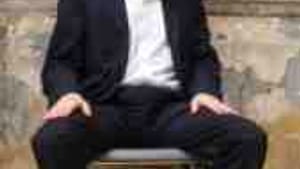Stay in the Loop
BSR publishes on a weekly schedule, with an email newsletter every Wednesday and Thursday morning. There’s no paywall, and subscribing is always free.
Bordering on anxiety
Thaddeus Phillips's '17 Border Crossings' (1st review)

We are the global village that shares the Internet and drinks Coca-Cola. But this village also shares the DNA of a tribal xenophobia where international borders, and even intra-national borders, mark the edges of oppositional tectonic plates that exude tension and are always prone to eruption.
Although some borders, like the Berlin wall may occasionally disappear, some 26,000 kilometers of new border walls and barriers have appeared since 2001. The very idea of boundaries ignites the artistry of Thaddeus Phillips in 17 Border Crossings, his new one-man show of dramatic monologues.
Phillips's inventive and mirthful theater has often riffed Shakespeare's "all the world's a stage": His work traverses foreign terrains and cultures, suggesting that the world contains far more dramatic subject matter than makes it onto our stages. (See my prior BSR reviews of Phillips's El Conquistador! (2010) and Microworlds (2009).
Mistaken assurance
With 17 Border Crossings, this multi-talented theater wizard renders his own international travel in the last two decades as the subject of this new work. By framing his sequential monologues on border crossings— an experience that we personally identify with anxiety and governmental coercion— he assembles a mix of associative experiences from which he can draw humor as well as make his political critiques.
Phillips's most threatening experiences come as he crosses the war-torn borders of Bosnia, Croatia and Serbia in the 1990s, his fears assuaged by the State Department's assurances that it's safe to do so. But as he discovers after boarding an almost empty ferry entering a war zone, the advice was dead wrong.
It's hilarious to hear Phillips describe antics that must have been terrifying to witness and experience— for example, seeing a fellow passenger in his train compartment toss smuggled suitcases out the window after crossing a border. Phillips finds the borders within borders, as in Mostar, where the war creates a newly divided east and west Mostar of Christians and Moslems, with dueling sound systems chillingly recreated on stage: amplified calls to prayers from minarets from one side, and amplified church bells ringing on the other.
Planting drugs
The border is the authoritarian state's first iron-fisted greeting to travelers. Phillips captures the varieties of this police presence, from the Matrix-like, sensuous Israeli border guards, to Colombian border agents pointing to his Moroccan slippers and shouting "Taliban" at him; to another Colombian agent planting a baggie of drugs in his luggage, only to quickly abort this scheme to frame him when an alerted Phillips says his girlfriend's uncle is a famous Colombia telenovela actor.
This is Phillips's first work in dramatic monologue, and his rapid-fire delivery of words in the native languages of the countries he enters is delightful. But 17 Border Crossings is visually understated, with only minimal props, and I missed something of the brilliant visuality and inventiveness he has brought to his past performances, which bring more than the text into play.
Dislocated Jordanian
Although his humor and political critique don't always sustain interest, many segments do. I hope for more flights of the Phillips imagination— as in his encounter with a Brazilian or Peruvian shaman for whom there are no terrestrial borders but simply eons of time, or of the utter dislocation of a Jordanian born to a British mother, who speaks Cockney English and who keeps asking "Wot's it lyke?" in England.
Our own national border provides the conclusion of 17 Border Crossings, as it poses a hurdle for Phillips's own re-entry as well as a more formidable obstacle for Mexicans entering from the south. The work ends with a U.S. border patrolman abandoning his vehicle and post at the border, and dissolving into the night desert. A fitting epitaph for borders.♦
To read another review by Merilyn Jackson, click here.
Although some borders, like the Berlin wall may occasionally disappear, some 26,000 kilometers of new border walls and barriers have appeared since 2001. The very idea of boundaries ignites the artistry of Thaddeus Phillips in 17 Border Crossings, his new one-man show of dramatic monologues.
Phillips's inventive and mirthful theater has often riffed Shakespeare's "all the world's a stage": His work traverses foreign terrains and cultures, suggesting that the world contains far more dramatic subject matter than makes it onto our stages. (See my prior BSR reviews of Phillips's El Conquistador! (2010) and Microworlds (2009).
Mistaken assurance
With 17 Border Crossings, this multi-talented theater wizard renders his own international travel in the last two decades as the subject of this new work. By framing his sequential monologues on border crossings— an experience that we personally identify with anxiety and governmental coercion— he assembles a mix of associative experiences from which he can draw humor as well as make his political critiques.
Phillips's most threatening experiences come as he crosses the war-torn borders of Bosnia, Croatia and Serbia in the 1990s, his fears assuaged by the State Department's assurances that it's safe to do so. But as he discovers after boarding an almost empty ferry entering a war zone, the advice was dead wrong.
It's hilarious to hear Phillips describe antics that must have been terrifying to witness and experience— for example, seeing a fellow passenger in his train compartment toss smuggled suitcases out the window after crossing a border. Phillips finds the borders within borders, as in Mostar, where the war creates a newly divided east and west Mostar of Christians and Moslems, with dueling sound systems chillingly recreated on stage: amplified calls to prayers from minarets from one side, and amplified church bells ringing on the other.
Planting drugs
The border is the authoritarian state's first iron-fisted greeting to travelers. Phillips captures the varieties of this police presence, from the Matrix-like, sensuous Israeli border guards, to Colombian border agents pointing to his Moroccan slippers and shouting "Taliban" at him; to another Colombian agent planting a baggie of drugs in his luggage, only to quickly abort this scheme to frame him when an alerted Phillips says his girlfriend's uncle is a famous Colombia telenovela actor.
This is Phillips's first work in dramatic monologue, and his rapid-fire delivery of words in the native languages of the countries he enters is delightful. But 17 Border Crossings is visually understated, with only minimal props, and I missed something of the brilliant visuality and inventiveness he has brought to his past performances, which bring more than the text into play.
Dislocated Jordanian
Although his humor and political critique don't always sustain interest, many segments do. I hope for more flights of the Phillips imagination— as in his encounter with a Brazilian or Peruvian shaman for whom there are no terrestrial borders but simply eons of time, or of the utter dislocation of a Jordanian born to a British mother, who speaks Cockney English and who keeps asking "Wot's it lyke?" in England.
Our own national border provides the conclusion of 17 Border Crossings, as it poses a hurdle for Phillips's own re-entry as well as a more formidable obstacle for Mexicans entering from the south. The work ends with a U.S. border patrolman abandoning his vehicle and post at the border, and dissolving into the night desert. A fitting epitaph for borders.♦
To read another review by Merilyn Jackson, click here.
Sign up for our newsletter
All of the week's new articles, all in one place. Sign up for the free weekly BSR newsletters, and don't miss a conversation.
 Jonathan M. Stein
Jonathan M. Stein